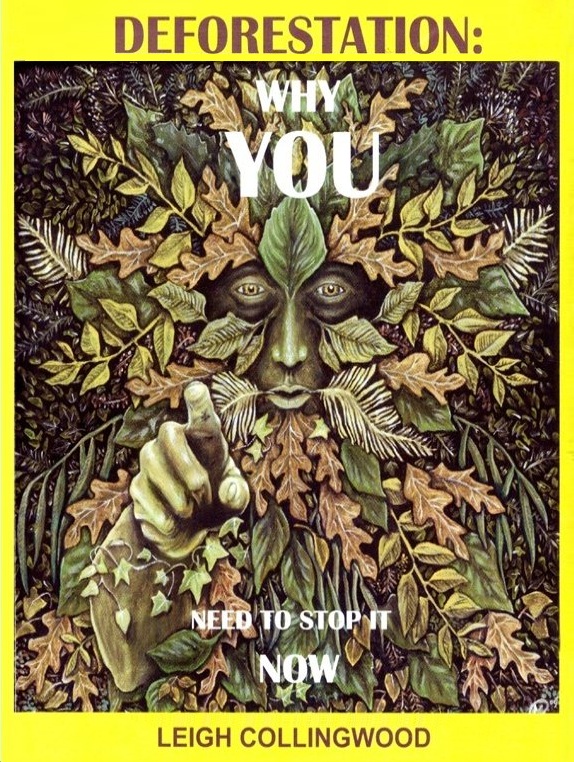Deforestation is just one of many crises facing the world. It is closely related to environmental crises such as climate change. Modern human relationships with nature are profoundly dysfunctional and, on the current trajectory, can only lead to a global ecological catastrophe.
So says Leigh Collingwood in 'Deforestation: Need to stop it now.' It deals with two chief elements, apart from the primary subject of deforestation: WHY and YOU. Once you understand why you need to take action, you understand why it's up to you and that, if you care, you can't rely on someone else to stop deforestation or any other form of environmental destruction. "We certainly can't look to big business and government (the very agencies which most people are naively hoping and expecting to do something to stop it) because big business drives deforestation and governments are in the pocket of big business. However, it is our demand for consumer goods that provides the life-blood for big business, bringing culpability for all deforestation and other environmental carnage back to us ultimately."

So "YOU" is everyone, at all socio-economic levels. Taking personal responsibility for deforestation, whoever you are, is a principal point made in the book. However, while the issues covered here are universal and for the attention of all of us, the concepts conveyed are directed more at the global elite which is portrayed as being ultimately accountable for the mess we're in, even if we all share in responsibility. It is individual commitment to action at the top that will have the most influence and leverage.
It would be nice if "the masses" were to read the book and apply the principles and recommendations outlined therein as it does, after all, call for a mass boycott of the global consumer economy, with the resulting unemployed people being taken up by relocalised, labour-intensive organic food production projects. At the very least, the book should find followers amongst those whom E.F. Schumacher has referred to (in his book, Small is Beautiful) as "intelligent layman" activists. Perhaps the more enlightened members of our society, inspired by the contents of the book, will mobilise the masses via the now pervasive social network media to create the sort of mass "grass roots" movement that could make a real difference from the bottom up.
modern world = environmental destruction
The approach of the book is essentially to encourage and assist the reader in understanding the way the modern world works and, in particular, why it only works by destroying the environment. "Capitalism", or what is here redefined as "consumer industrialism", works only by appropriating resources and wildlife habitat, dumping polluting by-products and wastes into the environment, manufacturing consumer goods with built-in obsolescence to deliberately create new demand, and creating and exploiting general ignorance and spiritual nihilism ("perpetual want") in the public.
To the end of re-educating and empowering the public, the book identifies and develops a "lowest common denominator" or dominant theme which is this: The mainstream academic orthodoxies influencing all levels of socio-political thinking have, for at least a century to date, ignored the second law of thermodynamics ("the second law") in all fields of learning except those where it absolutely cannot be ignored, such as in practical thermal mechanical micro-systems (eg. all combustion engines).
One of its principal arguments is that, emanating from the highest level of the global elite, there is a deliberate strategy of creating ignorance, particularly in respect of certain realities pertaining to the utter lack of sustainability of the artificial macro-systems impacting on our lives. These macro-systems - primarily our energy sourcing and distribution systems but, generally, all socio-economic systems, down to even our religious and quasi-religious (ie political/values) codes - are all profoundly unsustainable because they all, in their own ways, violate the most basic of physical and natural laws.
Why would the elite want to perpetrate such a "conspiracy of ignorance"? The book argues that all socio-economic expansion, both ancient and modern, but particularly that of the last 350 years, has been based on appropriating natural energy capital principally in the form of wood but also, in the last approximately 200 years, in the form of fossil fuels.
an awesomely complex mess
Man has now got himself into an awesomely complex mess, by not only appropriating this natural energy capital at a massively unsustainable rate, but has compounded the problem by perpetrating the lie that the "wealth" and "prosperity" of the modern age, are all due to "enlightened", "progressive", material values based on "reason" and "democracy". This complex of factors, generally known as "The Enlightenment" or "Age of Reason" (which commenced essentially with the birth of the Royal Society in 1660) has actually been more an age of quasi-religious belief given that it excludes so much of our experience from its definition of what constitutes "legitimate" reality.
The ultimate test of reason is sustainability. If we're not living sustainably, which we're not, we're not living according to reason, fully reckoned. At the very least, true reason should have respect for the second law, which demands that the energy "accounts" of any open thermodynamic system must balance indefinitely to qualify for the description of "sustainable". All living beings and ecosystems are examples of such "open thermodynamic systems" and on planet Earth there is only one energy source of indefinite duration and that's the sun.
It follows that to be truly sustainable, all living beings and systems must not demand any more energy than can be provided by current solar influx and all natural species and ecosystems have evolved in such a way as to comply with this requirement. In fact, this must be Nature's central concern given the ultra-long-term time-scales required for the evolution of species and of biodiversity generally.
Man, however, has taken it upon himself to break away from adherence to this most important of physical laws. Our modern attitudes towards energy consumption completely ignore the second law in that we think and act as if our current energy-hungry socio-economic system can go on forever while it clearly can't when checked against the requirements for indefinite sustainability. It may come as a shock to the reader, but the book contends that the only truly sustainable lifestyle for Man is that of the huntergatherer or what it refers to as "Natural Man" - ie Man living in harmony with Nature.
living in harmony with Nature
"Man living in harmony with Nature" therefore means living as an integrated part of Nature sustainably within Nature's (thermo-)dynamic equilibrium. The book argues that the Biblical account of the idyllic Garden of Eden is actually all about sustainable thermodynamic harmony. "The Fall," therefore, was nothing more than agricultural Man falling out of harmony with Nature by dominating Nature thermodynamically by the acquisition of surplus solar energy (in the form of carbohydrate crops) which is essentially what agriculture is all about.
This falling out of harmony with Nature has inevitable spiritual ramifications and the physio-spiritual links are explored by interpreting biblical myth thermodynamically and through the principles of hermetic analogy where, for example, the macrocosm is reflected in the microcosm. So Man's separation from Nature (the macrocosm) is reflected in the splitting or dis-integration of his mind and of his perceived universe (the microcosm). This has led ultimately, and inevitably, to our highly fragmented way of understanding our complex global economic system, to the point where we can no longer see the environmentally destructive consequences of our actions.
Hence we perpetrate "unconscious evil" which is, firstly, the destruction of the biodiversity and ecosystems that constitute the very basis and essence of our own evolutionary emergence and spiritual relationship with Nature. Secondly, we are destroying our own environmental food and water supply systems thus qualifying this as truly "stupid evil" in that it is unequivocally self-destructive.
self-destructive evils defined
This suicidal evil has a name (as used by Rupert Sheldrake in his The Rebirth of Nature), secular humanism, which is where fallen, dis-integrated Man claims absolute prerogatives with respect to what happens to Nature as a result of his actions simply because he has the power to. Secular humanism is essentially fallen Man's unbalanced, collective ego rampantly overriding his conscience, now fatally relegated to obscurity as a consequence of his mental and spiritual disintegration. Self-centeredness, short-termism and narrow vision - the proclivities of Fallen Man at the base of everything that is stupid and self-destructive about him, are all symptoms of unbalanced, dysfunctional ego in both the individual and the collective.
Several sources are cited (including Jared Diamond's book, Collapse) which testify to the role of ego in societal collapse due to environmental over-exploitation. Diamond's most renowned and instructive case study - that of Easter Island - shows that what the Easter Islanders did to their tiny isolated island, and ultimately to themselves, is perfectly analogous to what we're doing right now to the entire planet and to ourselves (as Mankind). The Easter Island story thus serves as a microcosmic warning and example of our own possible hellish fate in a global ecological and population collapse.
The book asserts that our so-called "leaders" know exactly what's going on, yet this knowledge is not being disseminated as it should be if we're to save the planet as a common objective. They know that we must "put the brakes on" due to looming resource limitations yet cannot contemplate admitting to the lie of the "Enlightenment" with its empty promises of a bright future, allegedly founded solely on technology and "reason" and where anything as mundane as resource depletion is never an issue.
fossil fuels firmly ensconced
One of the principal classes of resources sustaining the modern economy is fossil fuels, particularly oil, as they underpin almost all food production and the entire globalised manufacturing and transport network. Given that we're at the position of peak oil supply which threatens to fatally destabilise the entire system, so, the book theorises, the elite are using the global warming "crisis" as a contrived "proxy crisis" for the true crisis which is peak oil. In this way, it is hoped that by mitigating the direct proxy for fossil fuel usage (ie carbon dioxide emissions) so the consumption of fossil fuels, particularly oil, will be mitigated. The oblique approach is necessary to avoid admitting to the real "inconvenient truth" of not merely hydrocarbon dependence but ultimately that the "Enlightenment" was actually the terminal spiritual endarkenment of the west and of the countries which it has colonised for centuries.
In addition to proposing action to boycott the consumer economy via the purposeful and well-informed spending of our money (our only real and powerful vote), the book describes and advocates a new synthesis of the animism of Natural Man and the limited "reason" of modern Man to arrive at a moral and value "system" based ultimately on reason - here used again in its broad sense where sustainability and "thermodynamic justice" for all living beings are its principal criteria. This should lead to the correct attitude towards Nature that, hopefully, has the same effect as the animism of Natural Man who respects and reveres Nature totally and unconditionally.
About the author
Leigh Collingwood is a graduate of Rhodes University, holding a B. Social Science degree in Psychology and Economics. He is however mostly self-taught, having been a reader in the full spectrum of the natural and human sciences since his early teens. Having avoided what he regards as the trap of specialisation in his lifelong quest for truth, he is a generalist in the most meaningful sense, as evidenced by the necessarily broad scope of his book. This is the foundation for his independence of thought and his current role as an “intelligent layman” activist, this term borrowed from dissident economist EF Schumacher, author of the book Small is Beautiful – a Study of Economics as if People Mattered.
Limited print copies are available directly from the author at only R250 + P&P;:
- Phone Leigh on 0826920690 or email This e-mail address is being protected from spambots. You need JavaScript enabled to view it
Alternatively, contact Imagine Books, Heritage Centre, Hillcrest:
- Phone 031 7652012 or email This e-mail address is being protected from spambots. You need JavaScript enabled to view it
Photo:
The US based Cargill corporation burns large areas of rainforest to prepare for soya plantations. Source: Greenpeace






